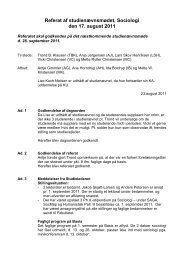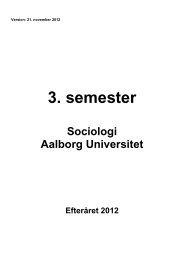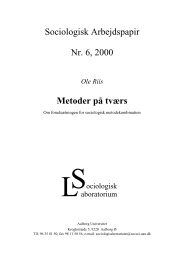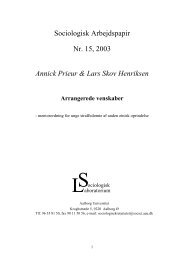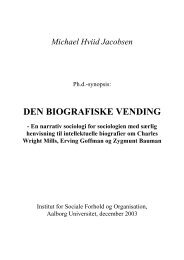Utopianism in the Work of Zygmunt Bauman - Sociologi - Aalborg ...
Utopianism in the Work of Zygmunt Bauman - Sociologi - Aalborg ...
Utopianism in the Work of Zygmunt Bauman - Sociologi - Aalborg ...
You also want an ePaper? Increase the reach of your titles
YUMPU automatically turns print PDFs into web optimized ePapers that Google loves.
ground that <strong>the</strong> ideas and ideals which <strong>the</strong>y ventured to espouse were ‘Utopian’<br />
(Hacker 1955:135).<br />
As a consequence, utopianism has frequently been l<strong>in</strong>ked to <strong>in</strong>ferior k<strong>in</strong>ds <strong>of</strong><br />
scientific thought and has been relegated to <strong>the</strong> outskirts <strong>of</strong> sociological <strong>the</strong>ory<br />
by derogatory descriptions and comparisons to useless activity or irrational<br />
waste <strong>of</strong> time. Actually, utopianism and <strong>the</strong> idea <strong>of</strong> an ideal state <strong>in</strong>forms and<br />
motivates most human and even animal life (cf. Hufschmid 2001) and utopian<br />
th<strong>in</strong>k<strong>in</strong>g and <strong>the</strong>oris<strong>in</strong>g used to po<strong>in</strong>t to <strong>the</strong> noblest and most valued aspects <strong>of</strong><br />
abstract philosophy as well as practical political statements, as was seen <strong>in</strong> <strong>the</strong><br />
works <strong>of</strong> Plato and Aristotle, but this ancient understand<strong>in</strong>g has <strong>in</strong> recent dec-<br />
ades fallen entirely <strong>in</strong>to disrepute. ‘Utopia’, a term that <strong>in</strong> today’s usage has lost<br />
almost any positive mean<strong>in</strong>g, was <strong>in</strong> fact orig<strong>in</strong>ally derived from <strong>the</strong> Greek by<br />
Sir Thomas More mean<strong>in</strong>g ‘nowhere’ (outopia) at <strong>the</strong> same time as this no-<br />
where <strong>of</strong>fers someth<strong>in</strong>g ‘good’ (eutopia)(Kumar 1990:1). Thus, it semantically<br />
refers to a non-place where th<strong>in</strong>gs are good but simultaneously it connotes<br />
many different mean<strong>in</strong>gs <strong>of</strong> such as a land <strong>of</strong> milk and honey, a Shangri-La, a<br />
Garden <strong>of</strong> Eden never to be reached, always irritat<strong>in</strong>gly and <strong>in</strong>trigu<strong>in</strong>gly beyond<br />
human touch but always lurk<strong>in</strong>g <strong>in</strong> <strong>the</strong> back <strong>of</strong> our m<strong>in</strong>ds and at least some <strong>of</strong><br />
our actions. Whe<strong>the</strong>r located <strong>in</strong> an idyllic past, as Romanticists tend to do with<br />
<strong>the</strong>ir utopian ideals, or <strong>in</strong> a stage <strong>of</strong> future development towards which we can<br />
only strive through social reforms or revolutions, as Futurists have been known<br />
to do, utopia is never here and now. It is apparently a dream we hope only to<br />
dive <strong>in</strong>to <strong>in</strong> order to escape <strong>the</strong> nightmare <strong>of</strong> reality.<br />
Ever s<strong>in</strong>ce its ancient Greek embryo, utopianism has been a key concern <strong>in</strong><br />
political, philosophical and literary thought. Def<strong>in</strong><strong>in</strong>g utopia or captur<strong>in</strong>g it <strong>in</strong><br />
one sentence is almost impossible. Accord<strong>in</strong>g to Karl Mannheim, one <strong>of</strong> <strong>the</strong><br />
most prom<strong>in</strong>ent analysts <strong>of</strong> utopia with<strong>in</strong> <strong>the</strong> discipl<strong>in</strong>e <strong>of</strong> sociology, utopia<br />
8



